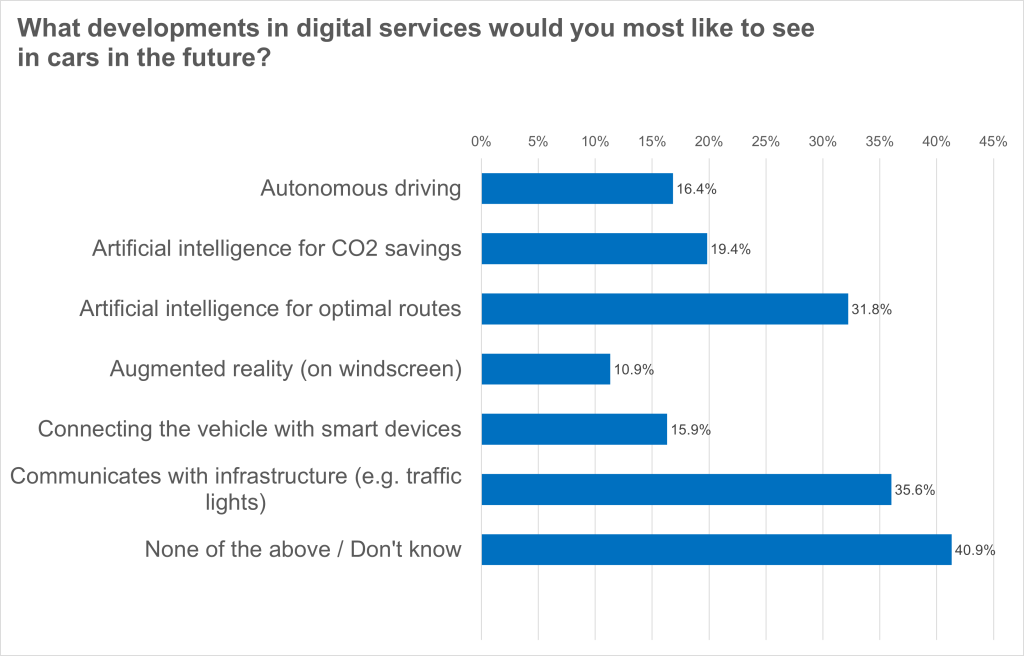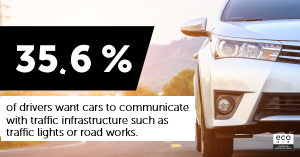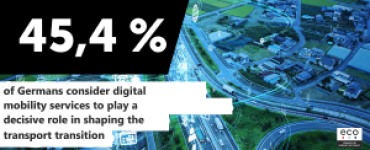- 35.6 per cent of respondents want cars to communicate with traffic infrastructure such as traffic lights or road works
- Around a third (31.8 per cent) of respondents would like to see artificial intelligence used to optimise traffic control
- More men (21.6 per cent) than women (11.3 per cent) open to autonomous vehicles
- Augmented reality application scenarios relevant for only 10.9 per cent of respondents
More CO2 savings and optimised traffic control through artificial intelligence as well as vehicles that communicate with the traffic infrastructure such as traffic lights: This is the dream scenario of German motorists with regard to digital technologies and services in the automotive sector. This is the result of a survey conducted by the opinion research institute Civey on behalf of eco – Association of the Internet Industry, at the end of July 2023 among 2,500 car users – on the occasion of the IAA in Munich at the beginning of September.
More connectivity in road traffic
Connected cars are at the top of the wish list of German car drivers. 35.6 per cent of those surveyed want cars to interact more with other vehicles and the outside world – for example, to receive information from other means of transport or the traffic infrastructure such as traffic lights, road works or emergency vehicles, and in turn to send information to their environment themselves. “The car as a means of transport is no longer an isolated object, but part of a digital mobility ecosystem that spans the globe,” says Oliver Süme, Chair of the Board of the eco Association. In order to build and establish the necessary digital infrastructure, a strong Internet industry is needed, and digital companies will therefore play an increasingly important role in the mobility ecosystem, Süme continued. This is also illustrated by the strategic orientation of the IAA under the motto “Experience Connected Mobility” – away from the classic automotive trade fair towards connected mobility and comprehensive mobility topics.
“The connected mobility ecosystem requires reliable data processing on a grand scale: route planning, position data, speed data, environmental data, driving behaviour data, entertainment and maintenance data. The prerequisites for this are investments in 5G technology, powerful data centres and clear and proportionate rules for the exchange of data, as well as incentives for standardisation and the establishment of data trusts to make mobility more convenient, faster and safer,” adds Süme. The sensible linking and smart evaluation of the growing amounts of data is the key to innovation and sustainable, demand-oriented mobility.
Artificial intelligence for traffic management and CO2 savings
Almost one third (31.8 per cent) of the respondents would also like to see traffic flows managed better in the future with the help of artificial intelligence in order to avoid traffic jams and achieve better route utilisation. However, the use of vehicle data should not only help to plan traffic intelligently, but also save CO2. 19.4 per cent of drivers advocate using artificial intelligence in the future to achieve CO2 savings in the mobility sector. “The survey results underline the need for measures to promote multimodal mobility platforms as well as data-based transport planning. The transport sector, in particular, is lagging behind the climate targets. In Germany, the transport sector accounts for around 20 per cent of greenhouse gas emissions. Networking, big data and artificial intelligence can help to accelerate the transport turnaround and set the course for a sustainable mobility future,” emphasises Süme. According to a study by Arthur D. Little, the volume of CO2 emissions in Germany could be reduced by 14 megatonnes by 2030 with the help of connected mobility solutions, which amounts to about 20 per cent of the transport emissions forecast for 2050.2 Already today, navigation apps such as Google Maps show users the route with the lowest CO2 emissions by default if the estimated arrival time is comparable to the fastest route.
Autonomous driving and augmented reality
Germans, on the other hand, are more hesitant about autonomous driving or augmented reality applications. Only 16.4 per cent of car users want to be on the road in autonomous vehicles in the future. Men are far more open to the technology than women. About one in five men (21.6 per cent) would like to see more self-driving cars, but only about one in ten women (11.3 per cent). Digital technologies based on augmented reality, such as the projection of driving-relevant information in the windscreen, are the least relevant for the respondents. Only about one in ten would like to see more augmented reality technologies in the car of the future.
Further information on the topic of mobility
Further information on digitalisation and sustainability

*The opinion research company Civey surveyed 2,500 German drivers aged 18 and over between 24 and 31 July 2023 on behalf of eco. The results are representative for drivers in Germany aged 18 and over. The statistical error of the overall results is 3.2 per cent.
** Digital Transformation for More Sustainability:
“The Positive Impact of Digital Technologies and Infrastructures on the Carbon Footprint of Industry and Society” by Arthur D. Little on behalf of eco




